
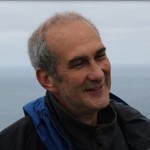 Roberto Colombo is professor of Remote Sensing at the Department of Environmental Sciences, University of Milano Bicocca. The main research interest is to develop remote sensing tools for quantitative estimation of land surface properties. He works with a wide range of Earth Observation data at different scales and geophysical methods, assimilating multi-source, multi-spectral and multi-temporal remote sensing data, from field spectroscopy to satellite level for modelling terrestrial and environmental dynamics, with focus on vegetation fluorescence and snow properties. Current activities include space mission concepts and definition, airborne campaigns and field cal/val strategies, engineering and design of proximal remote sensing instruments, algorithm development, environmental modelling and new applications.
Roberto Colombo is professor of Remote Sensing at the Department of Environmental Sciences, University of Milano Bicocca. The main research interest is to develop remote sensing tools for quantitative estimation of land surface properties. He works with a wide range of Earth Observation data at different scales and geophysical methods, assimilating multi-source, multi-spectral and multi-temporal remote sensing data, from field spectroscopy to satellite level for modelling terrestrial and environmental dynamics, with focus on vegetation fluorescence and snow properties. Current activities include space mission concepts and definition, airborne campaigns and field cal/val strategies, engineering and design of proximal remote sensing instruments, algorithm development, environmental modelling and new applications.
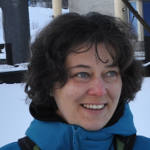 She is a senior researcher and assistant Professor at the Department of Physical, Earth and Environmental Sciences (DSFTA) of the University of Siena (Italy) since 1 November 2001. She is currently a lecturer in the following courses: Ecotoxicology of Remote Areas (Master's Degree); Marine Ecology (Bachelor's Degree). She is responsible for the Curriculum in Biology, Ecology, Biodiversity of the PhD of National Interest in Polar Sciences (Ca' Foscari University of Venice); she is a member of the Board of Professors of the PhD in Environmental, Geological and Polar Sciences and Technologies.
She is a senior researcher and assistant Professor at the Department of Physical, Earth and Environmental Sciences (DSFTA) of the University of Siena (Italy) since 1 November 2001. She is currently a lecturer in the following courses: Ecotoxicology of Remote Areas (Master's Degree); Marine Ecology (Bachelor's Degree). She is responsible for the Curriculum in Biology, Ecology, Biodiversity of the PhD of National Interest in Polar Sciences (Ca' Foscari University of Venice); she is a member of the Board of Professors of the PhD in Environmental, Geological and Polar Sciences and Technologies.
She collaborates with colleagues from Italian and foreign universities/research institutions. Since 1994 she works in the Italian National Antarctic Research Programme (PNRA) and has participated in seven Antarctic Expeditions. She is part of the international program TUNU-Programme: Euro-Arctic Marine Fishes—Diversity and Adaptation, coordinated by UiT The Arctic University of Norway in Tromsø, participating in six expeditions in the Arctic; in this programme she has studied the ecotoxicology of the Greenland shark (Somniosus microcephalus). She is president of the Action Group "Input Pathways of Persistent Organic Pollutants to Antarctica, ImPACT" of the Scientific Committee on Antarctic Research (SCAR). Since 2019 she has been a member of the Expert Group on POPs of the Arctic Monitoring and Assessment Programme (AMAP). She is P.I. of the Laboratory of Ecotoxicology and Remote Areas (ERRe LAB) of the DSFTA.
The main research interests include the ecotoxicology of persistent organic pollutants (POPs) in the Polar Regions, and marine ecology. In particular: study of POPs and emerging contaminants under climate-driven changes; POP fluxes between abiotic and biotic ecosystem compartments and from tissue to community levels; bioaccumulation in predators and trophic webs; risk assessment (TEQ); POPs in food and human risk (TWI, EDI); ecology of seabirds (1994-2005).
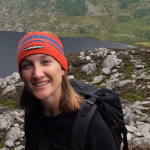 After receiving her Bachelor's degree in Geology from the University of Trieste and her Master's degree in Atmospheric Sciences from the University of Innsbruck, she completed a PhD in palaeoclimate modelling at the University of Trieste and the Abdus Salam International Center for Theoretical Physics (ICTP). She has since conducted research at ICTP, CNR-ISP, and the University of Quebec in Montreal, focusing on climate-cryosphere interactions in the Alps and the Arctic, spanning from the Last Glacial Maximum (LGM) to future scenarios. She has participated in several scientific expeditions in the Himalayas, Greenland, and the Central-Eastern Alps and is actively engaged in outreach activities
After receiving her Bachelor's degree in Geology from the University of Trieste and her Master's degree in Atmospheric Sciences from the University of Innsbruck, she completed a PhD in palaeoclimate modelling at the University of Trieste and the Abdus Salam International Center for Theoretical Physics (ICTP). She has since conducted research at ICTP, CNR-ISP, and the University of Quebec in Montreal, focusing on climate-cryosphere interactions in the Alps and the Arctic, spanning from the Last Glacial Maximum (LGM) to future scenarios. She has participated in several scientific expeditions in the Himalayas, Greenland, and the Central-Eastern Alps and is actively engaged in outreach activities
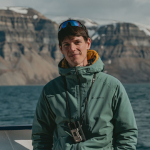 Graduated in Chemistry in 2023 at the University of Bologna with a thesis on the chemical characterization, by means of 1H-NMR spectroscopy, of the organic aerosol sampled in Ny-Ålesund.
Graduated in Chemistry in 2023 at the University of Bologna with a thesis on the chemical characterization, by means of 1H-NMR spectroscopy, of the organic aerosol sampled in Ny-Ålesund.
Since December 2023 PhD student in Polar Sciences at the Ca' Foscari University of Venice. The research, conducted in conjunction with the Institute of Polar Sciences on the Milan and Venice campuses, aims to improve the knowledge of aerosol-cloud interactions in the Arctic climate system. The microphysical and chemical properties of atmospheric particulate matter are investigated in detail to assess particles' ability to act as cloud condensation nuclei (CCN) and ice nuclei (IN).
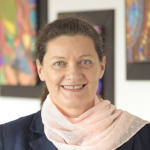 Anna Maria Fioretti graduated in Geology at the University of Padua (Italy) in 1983 and in 2007 she obtained a Master in Science Communication. Since 1985 she has been working for the National Research Council (CNR) at the Center for the Study of the Eastern Alps that afterwards became part of the Institute of Geosciences and Earth Resources. Her scientific activity focused on the genesis and evolution of magmas and extraterrestrial rocks (meteorites). She took part in three expeditions in Antarctica within the Italian National Antarctic Research Program.
Anna Maria Fioretti graduated in Geology at the University of Padua (Italy) in 1983 and in 2007 she obtained a Master in Science Communication. Since 1985 she has been working for the National Research Council (CNR) at the Center for the Study of the Eastern Alps that afterwards became part of the Institute of Geosciences and Earth Resources. Her scientific activity focused on the genesis and evolution of magmas and extraterrestrial rocks (meteorites). She took part in three expeditions in Antarctica within the Italian National Antarctic Research Program.
She was member of the Polar Research Committee of the CNR (CRP) and of the National Scientific Committee for Antarctica (CSNA). In 2017-2021 she was appointed as Science Attaché at the Embassy of Italy in Australia. Back to Italy, she was seconded at General Directorate for Global Affairs of the Italian Ministry of Foreign Affairs (MAECI) as an expert on Antarctic matters.
After retiring, she is now continuing her cooperation with the MAECI, on a voluntary basis, and she represents the CNR in the Strategic Board of the Ice-Memory Foundation.
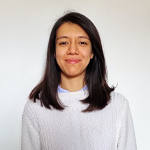 Bachelor's and Master's degree in Chemistry at Università degli studi di Perugia, with both thesis projects focused on the analysis of data from an environmental monitoring station. The study on atmospheric Black Carbon continued at the same university for a few months after graduation.
Bachelor's and Master's degree in Chemistry at Università degli studi di Perugia, with both thesis projects focused on the analysis of data from an environmental monitoring station. The study on atmospheric Black Carbon continued at the same university for a few months after graduation.
From November 2021 she is a PhD student at Università G. D'Annunzio di Chieti-Pescara, with a project revolving around the study of radiation budget and cloud cover in Antarctica and carried out at the CNR-ISP in Bologna.
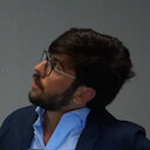 Master’s degree in environmental sciences at the University of Pisa. After a two-months period at the National Natural history Museum in Luxembourg, and after a period spent as a research fellow in the University of Pisa, I enrolled in the Polar Science Ph.D. program at the university of Ca’Foscari in Venice. My research revolves around paleoenvironmental reconstruction in Antarctica’s fjord utilizing calcareous microfossils.
Master’s degree in environmental sciences at the University of Pisa. After a two-months period at the National Natural history Museum in Luxembourg, and after a period spent as a research fellow in the University of Pisa, I enrolled in the Polar Science Ph.D. program at the university of Ca’Foscari in Venice. My research revolves around paleoenvironmental reconstruction in Antarctica’s fjord utilizing calcareous microfossils.
![]() https://orcid.org/0009-0008-2199-379X Research gate
https://orcid.org/0009-0008-2199-379X Research gate
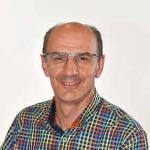 Full Professor at the Ca’ Foscari University of Venice. Since 2003 he has supervised teaching activities in the Degree Courses in Chemistry, in Chemical Sciences for Conservation and Restoration (SCCR), in Materials Science and Technologies and in Environmental Sciences. His research is focused mainly on: 1) studies on the origin, seasonal evolution and environmental fate of organic sulfur compounds of biological origin (dimethyl sulfide, carbon sulfide and dimethyl sulfonyopropionate) produced in the aquatic system; 2) development of analytical methodologies for the determination of organic micro pollutants (PCB, PAH, PCN, PBDE, PCDD, PCDF, IA) in environmental matrices (water, sediment, atmospheric aerosol) by gas chromatography coupled to both low and high resolution mass spectrometry; 3) development of analytical methodologies for the determination of natural organic compounds (amino acids, sugars, methoxyphenols, algal and fungal toxins, etc.. ) and anthropic (fragrances, aromatic pollutants) in water, biota, aerosol, snow and ice by liquid chromatography coupled with mass spectrometry for the study of local, global contamination and climate change. This activity has led to collaborations with various research groups (Griffith University, Australia; University of Charleston, U.S.A.; Boston College, U.S.A.; University of Sarajevo, Bosnia and Herzegovina; University of Belgrade, Serbia; Aristotle University of Thessaloniki, Greece; University of Rijeka, Croatia; University of Tirana, Albania, etc.. ).
Full Professor at the Ca’ Foscari University of Venice. Since 2003 he has supervised teaching activities in the Degree Courses in Chemistry, in Chemical Sciences for Conservation and Restoration (SCCR), in Materials Science and Technologies and in Environmental Sciences. His research is focused mainly on: 1) studies on the origin, seasonal evolution and environmental fate of organic sulfur compounds of biological origin (dimethyl sulfide, carbon sulfide and dimethyl sulfonyopropionate) produced in the aquatic system; 2) development of analytical methodologies for the determination of organic micro pollutants (PCB, PAH, PCN, PBDE, PCDD, PCDF, IA) in environmental matrices (water, sediment, atmospheric aerosol) by gas chromatography coupled to both low and high resolution mass spectrometry; 3) development of analytical methodologies for the determination of natural organic compounds (amino acids, sugars, methoxyphenols, algal and fungal toxins, etc.. ) and anthropic (fragrances, aromatic pollutants) in water, biota, aerosol, snow and ice by liquid chromatography coupled with mass spectrometry for the study of local, global contamination and climate change. This activity has led to collaborations with various research groups (Griffith University, Australia; University of Charleston, U.S.A.; Boston College, U.S.A.; University of Sarajevo, Bosnia and Herzegovina; University of Belgrade, Serbia; Aristotle University of Thessaloniki, Greece; University of Rijeka, Croatia; University of Tirana, Albania, etc.. ).
As part of the National Antarctic Research Programme he was responsible for Research Unit (UO) in 2004-2006; Principal Investigator in 2010-2012; responsible of UO in 2013-2014 and since 2016.
The research activity has led to the publication of over 140 publications of which 126 appear on SCOPUS, 10 chapters of books and about 200 communications at national and international conferences (h-index= 30).
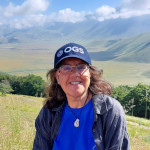 She graduated in Biological Sciences from the University of Siena in 1977, and worked as a research biologist and marine ecologist at the Anton Dohrn Zoological Station in Naples, at the current Ischia Marine Center, from 1983 to 2021, coordinating the Ischia team for some periods. Since 2021 she has been an associated researcher at the National Institute of Oceanography and Experimental Geophysics - OGS in Trieste, she is also associated with ISPRA-Rome (September 2023) and the Polar Scientific Institute of the CNR in Messina (May 2024). She has worked in the field of ecology of benthic biota, and coastal benthic ecosystems, with particular focus on the taxonomy and ecology of polychaete marine worms, and the ecology of seagrass systems, especially Posidonia oceanica. She has also worked in coastal polar environments, participating between 1989 and 2006 in 6 oceanographic expeditions to Antarctica and sub-Antarctica within the PNRA and the German and Spanish programmes, coordinating the research group of the SZN team in Ischia. For over 20 years she has been studying the effects of climate change on the benthos, in relation to both the increase in temperature (heat waves, alien species) and ocean acidification. In this later topic she is studying the ecology and eco-physiology of the benthic biota, including seagrasses, which live in particular coastal hydrothermal systems characterized by CO2 emissions from the seabed (vents) and natural acidification of the waters both at Ischia and in the Aeolian islands. She has supervised approximately 36 master's theses, 11 PhDs and 4 post-docs. She has served as Editor-in-Chief of the Journal Marine Ecology (Wiley; 2005-2013) and has published over 300 scientific papers and 4 books. Passionate about classical and popular music, she completed regular flute studies at the R. Franci music school of Siena.
She graduated in Biological Sciences from the University of Siena in 1977, and worked as a research biologist and marine ecologist at the Anton Dohrn Zoological Station in Naples, at the current Ischia Marine Center, from 1983 to 2021, coordinating the Ischia team for some periods. Since 2021 she has been an associated researcher at the National Institute of Oceanography and Experimental Geophysics - OGS in Trieste, she is also associated with ISPRA-Rome (September 2023) and the Polar Scientific Institute of the CNR in Messina (May 2024). She has worked in the field of ecology of benthic biota, and coastal benthic ecosystems, with particular focus on the taxonomy and ecology of polychaete marine worms, and the ecology of seagrass systems, especially Posidonia oceanica. She has also worked in coastal polar environments, participating between 1989 and 2006 in 6 oceanographic expeditions to Antarctica and sub-Antarctica within the PNRA and the German and Spanish programmes, coordinating the research group of the SZN team in Ischia. For over 20 years she has been studying the effects of climate change on the benthos, in relation to both the increase in temperature (heat waves, alien species) and ocean acidification. In this later topic she is studying the ecology and eco-physiology of the benthic biota, including seagrasses, which live in particular coastal hydrothermal systems characterized by CO2 emissions from the seabed (vents) and natural acidification of the waters both at Ischia and in the Aeolian islands. She has supervised approximately 36 master's theses, 11 PhDs and 4 post-docs. She has served as Editor-in-Chief of the Journal Marine Ecology (Wiley; 2005-2013) and has published over 300 scientific papers and 4 books. Passionate about classical and popular music, she completed regular flute studies at the R. Franci music school of Siena.
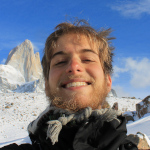 Bachelor in Geology at the Federal University of Rio Grande do Sul (UFRGS) and Master in Geochemistry from the same University. Since 2022 is developing his PhD thesis at Ca’ Foscari University of Venice in the program of Polar Sciences studying organic molecules in an Andean ice core to unveil the paleofire history in the Amazon region.
Bachelor in Geology at the Federal University of Rio Grande do Sul (UFRGS) and Master in Geochemistry from the same University. Since 2022 is developing his PhD thesis at Ca’ Foscari University of Venice in the program of Polar Sciences studying organic molecules in an Andean ice core to unveil the paleofire history in the Amazon region.
More...
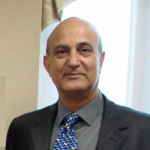 Since 1990 he is full professor of Ecology at the Faculty of Science of the University of Messina (Italy). General Secretary in the following NATO courses coordinated by Dr Trevor Platt, Halifax, Canada: (a) Lipari Island, Italy (12-24 October 1980) on Physiological ecology of Phytoplankton, (b) Bombannes (Bordeaux, France 12-20 May 1982) on Flows of energy and materials in marine ecosyistems: theory and practice, (c) S. Miniato, Italy (1-7 October 1985) on Physiological Ecology of photosynthetic Picopl9ankton in the Ocean. From 1990 to 2002, Italian Delegate to the Scientific Commission of the CCAMLR (Commission for the Conservation of Antarctic Marine Living Resources, Hobart (Tasmania, Australia). Over 60 months accumulated research experience at sea, including the following PNRA Italian Antarctic Expeditions as Principal Investigator: III Exp. (Terra Nova Bay Ecosystem,1987-88), V (South Pacific Sector,1989-90), X ROSSMIZE (Ross Sea Marginal Ice Zone Ecology,1994-95), XIII PIPEX (Pack Ice Plankton Expedition,1997-98), XV PIED (Pack Ice Ecosystem Dynamics 1999-2000), XX SEAROWS (Sea ice Ecology in the Antarctic: ROss and Weddell Seas) on the Polar Queen, Cariboo, Italica (1987-2002), Peri-Antarctic Oceanographic Expeditions in the Strait of Magellan I (1991) and II (1995), and one Arctic canadian cruise by N/R Hudson (1980). He has been Scientific Responsible of the Operative Unit Zooplankton and Micronekton in the following European projects: VECTOR, RITMARE, COCONET, MARINE STRATEGY. From 1968 to now, his research activity has been continuously addressed to issues on the zooplankton and micronekton ecology and biodiversity. Its main fields of study concern: (a) spatio-temporal distribution and daily vertical migrations (DVM) of marine zooplankton and micronekton communities in the Mediterranean and Polar ecosystems, in relation to the physical, chemical and biological water mass structure) (b) brackish environments functioning and biological response to stressor variables, (c) functioning of the coastal and pelagic food chain, with particular regard to the role of euphausiid and mesopelagic fish in the Deep Scattering Layer (DSL) (d) zooplankton role in the carbon cycle, (e) particles size spectrum (OPC) in the study of aquatic ecosystems (f) effects of climate change on the biology and ecology of Antarctic sea-ice and free water zooplankton communities. During 18 PNRA Antarctic expeditions (1987-2018) in Terra Nova Bay, Ross Sea and South Pacific Sector in free water and pack-fast-ice he collected about 6000 samples which are part of the zooplankton and micronekton collection laboratory of the University of Messina. In addition to the classic mesozooplankton and micronekton such as WP2, Indian Ocean Standard Net (IOSN), Bongo 40, IKMT, PHN, advanced electronic multinet are part of its field instrumentation such as BIONESS (1 m2) with 12 nets, MININESS (0.25 m2) with 10 nets 200, 500 and 1000 um, MICRONESS with 4 100 um nets, equipped with a multiparametric probe seabird 11 plus, fluorescence sensor and Optical Plankton Counter (OPC).
Since 1990 he is full professor of Ecology at the Faculty of Science of the University of Messina (Italy). General Secretary in the following NATO courses coordinated by Dr Trevor Platt, Halifax, Canada: (a) Lipari Island, Italy (12-24 October 1980) on Physiological ecology of Phytoplankton, (b) Bombannes (Bordeaux, France 12-20 May 1982) on Flows of energy and materials in marine ecosyistems: theory and practice, (c) S. Miniato, Italy (1-7 October 1985) on Physiological Ecology of photosynthetic Picopl9ankton in the Ocean. From 1990 to 2002, Italian Delegate to the Scientific Commission of the CCAMLR (Commission for the Conservation of Antarctic Marine Living Resources, Hobart (Tasmania, Australia). Over 60 months accumulated research experience at sea, including the following PNRA Italian Antarctic Expeditions as Principal Investigator: III Exp. (Terra Nova Bay Ecosystem,1987-88), V (South Pacific Sector,1989-90), X ROSSMIZE (Ross Sea Marginal Ice Zone Ecology,1994-95), XIII PIPEX (Pack Ice Plankton Expedition,1997-98), XV PIED (Pack Ice Ecosystem Dynamics 1999-2000), XX SEAROWS (Sea ice Ecology in the Antarctic: ROss and Weddell Seas) on the Polar Queen, Cariboo, Italica (1987-2002), Peri-Antarctic Oceanographic Expeditions in the Strait of Magellan I (1991) and II (1995), and one Arctic canadian cruise by N/R Hudson (1980). He has been Scientific Responsible of the Operative Unit Zooplankton and Micronekton in the following European projects: VECTOR, RITMARE, COCONET, MARINE STRATEGY. From 1968 to now, his research activity has been continuously addressed to issues on the zooplankton and micronekton ecology and biodiversity. Its main fields of study concern: (a) spatio-temporal distribution and daily vertical migrations (DVM) of marine zooplankton and micronekton communities in the Mediterranean and Polar ecosystems, in relation to the physical, chemical and biological water mass structure) (b) brackish environments functioning and biological response to stressor variables, (c) functioning of the coastal and pelagic food chain, with particular regard to the role of euphausiid and mesopelagic fish in the Deep Scattering Layer (DSL) (d) zooplankton role in the carbon cycle, (e) particles size spectrum (OPC) in the study of aquatic ecosystems (f) effects of climate change on the biology and ecology of Antarctic sea-ice and free water zooplankton communities. During 18 PNRA Antarctic expeditions (1987-2018) in Terra Nova Bay, Ross Sea and South Pacific Sector in free water and pack-fast-ice he collected about 6000 samples which are part of the zooplankton and micronekton collection laboratory of the University of Messina. In addition to the classic mesozooplankton and micronekton such as WP2, Indian Ocean Standard Net (IOSN), Bongo 40, IKMT, PHN, advanced electronic multinet are part of its field instrumentation such as BIONESS (1 m2) with 12 nets, MININESS (0.25 m2) with 10 nets 200, 500 and 1000 um, MICRONESS with 4 100 um nets, equipped with a multiparametric probe seabird 11 plus, fluorescence sensor and Optical Plankton Counter (OPC).
Research results are documented in more than 240 papers on national and international peer journals. Editor of these books: Atlas of Marine Zooplankton Strait of Magellan I Copepods (1995) and II Amphipods, Mysids, Euphausiids, Ostracods, Chaetognaths, Springer Verlag (1996); Ross Sea Ecology, Springer Verlag 2000; Mediterranean Ecosystems Structure and Processes, Springer Verlag (2001). Editor of the Research Topic "Ecology of Marine Zooplankton and Micronekton in Polar and Sub-Polar Areas” in Frontiers in Marine Biology (2023-2024).
 Marine biologist and oceanographer, Serena got three degrees from different universities: the undergraduate in Biological Sciences at the University of Genova, the master in marine biology at the University Politecnica delle Marche in Ancona, another master in 'Applied Physical Oceanography' at the University of Malta. She studied in detail the algae reproduction as well as the anchovies reproduction, while her specialisation as a marine biologist was about the study of the Sperm whales' acoustic. She wanted to protect the oceans and who lives in them, therefore in Malta she specialised into the study of the plastic pollution, with the use of a drone, deriving from an oceanic input as well as from humans, as a definition of a non education about the environment. Furthermore, her desire to know more in detail about other cetaceans species brought her for different summer seasons to Husavik, Iceland, working as a whale watching guide. From the humpback whales and the blue whales to the curiosity of knowing more about the ice, while looking at the glaciers in Iceland. Since then, she became a PhD student at the University of Ca' Foscari of Venice, in collaboration with the University of Milan-Bicocca, where she is studying the RICE ice core, in particular the fossils that she is finding into the core and the reason why they are there.
Marine biologist and oceanographer, Serena got three degrees from different universities: the undergraduate in Biological Sciences at the University of Genova, the master in marine biology at the University Politecnica delle Marche in Ancona, another master in 'Applied Physical Oceanography' at the University of Malta. She studied in detail the algae reproduction as well as the anchovies reproduction, while her specialisation as a marine biologist was about the study of the Sperm whales' acoustic. She wanted to protect the oceans and who lives in them, therefore in Malta she specialised into the study of the plastic pollution, with the use of a drone, deriving from an oceanic input as well as from humans, as a definition of a non education about the environment. Furthermore, her desire to know more in detail about other cetaceans species brought her for different summer seasons to Husavik, Iceland, working as a whale watching guide. From the humpback whales and the blue whales to the curiosity of knowing more about the ice, while looking at the glaciers in Iceland. Since then, she became a PhD student at the University of Ca' Foscari of Venice, in collaboration with the University of Milan-Bicocca, where she is studying the RICE ice core, in particular the fossils that she is finding into the core and the reason why they are there.
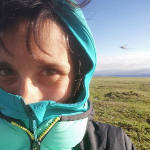 She attained the master’s degree with honours in Applied and Environmental Geology at the University of Turin in 2010, with a thesis entitled Distribution, origin and consequences of fluoride content in groundwater in an area of the central sector of the Ethiopian Rift. She specialized in the collection, analysis and dissemination of data in developing countries and in geological and hydrogeological mapping and modelling through GIS data management. The working experience in the Alpine environment allowed the deepening into pedological and geochemical subjects. She worked as study grant holder on the Nunataryuk EU-funded Horizon 2020 project, coordinated by the Alfred Wegener Institute, that aims to assess arctic permafrost thaw and study how it contributes to climate change.
She attained the master’s degree with honours in Applied and Environmental Geology at the University of Turin in 2010, with a thesis entitled Distribution, origin and consequences of fluoride content in groundwater in an area of the central sector of the Ethiopian Rift. She specialized in the collection, analysis and dissemination of data in developing countries and in geological and hydrogeological mapping and modelling through GIS data management. The working experience in the Alpine environment allowed the deepening into pedological and geochemical subjects. She worked as study grant holder on the Nunataryuk EU-funded Horizon 2020 project, coordinated by the Alfred Wegener Institute, that aims to assess arctic permafrost thaw and study how it contributes to climate change.
Present position: PhD Student at University Ca' Foscari Venezia, PhD in Polar Sciences; title of proposal: Modelling the fate of POPs distribution in permafrost: combine large scale to local perspective.
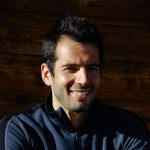 He received his master degree in nuclear and particle physics from Milano-Bicocca University in 2014. His background ranges from applied particle physics to environmental radioactivity and high-energy physics. His work at the nuclear fission reactor in Pavia (Italy) introduced him to the ice core science field. He did his PhD (2014-2017) at the Niels Bohr Institute (Copenhagen, Denmark), working on ice core continuous flow analysis systems and past sea ice reconstructions. He continued his research on climate reconstructions at the Niels Bohr Institute, at the Italian National Research Council and at the University of Venice in 2018 and 2019. Between 2020 and 2022 he was Marie Curie fellow at the University of Venice with a project on computer vision and Artificial Intelligence techniques applied to ice core analyses. Since September 2022 he works on glacier modeling via deep neural networks in collaboration with the University of California, Irvine. He is particularly interested in exploring AI and Machine Learning approaches to Earth System Science problems.
He received his master degree in nuclear and particle physics from Milano-Bicocca University in 2014. His background ranges from applied particle physics to environmental radioactivity and high-energy physics. His work at the nuclear fission reactor in Pavia (Italy) introduced him to the ice core science field. He did his PhD (2014-2017) at the Niels Bohr Institute (Copenhagen, Denmark), working on ice core continuous flow analysis systems and past sea ice reconstructions. He continued his research on climate reconstructions at the Niels Bohr Institute, at the Italian National Research Council and at the University of Venice in 2018 and 2019. Between 2020 and 2022 he was Marie Curie fellow at the University of Venice with a project on computer vision and Artificial Intelligence techniques applied to ice core analyses. Since September 2022 he works on glacier modeling via deep neural networks in collaboration with the University of California, Irvine. He is particularly interested in exploring AI and Machine Learning approaches to Earth System Science problems.
 Ministero dell'Universita e Ricerca
Ministero dell'Universita e Ricerca
Programma Ricerche Artico
Programma Nazionale di Ricerca in Antartide
 Ministero degli Affari Esteri e della Cooperazione Internazionale
Ministero degli Affari Esteri e della Cooperazione Internazionale
L'Italia e l’Artico
L’Italia e l’Antartide
CNR-ISP
National Research Council
Institute of Polar Sciences
c/o Scientific Campus - Ca' Foscari University Venice - Via Torino, 155 - 30172 VENEZIA MESTRE (VE)
Phone: +39 041 2348547 - E-mail: protocollo.isp AT pec.cnr.it
Fax: +39 041 2348 549 - Codice Fiscale: 80054330586 - P.I.:02118311006
Unless otherwise indicated, the content of this site is licensed : Attribution Non Commercial Share Alike 4.0 International (CC BY-NC-SA 4.0)
Privacy policy e Cookie policy - Transparent administration (CNR)








